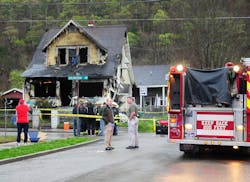USFA: West Virginians Twice as Likely to Die in Fires
West Virginians are about twice as likely to be killed by a fire as the average American, according to the U.S. Fire Administration.
In 2008, the last year that national data was available, 12 of every million Americans died in a fire. In West Virginia, the rate was 23.7 per million.
A state official said West Virginians make alarmingly low use of smoke detectors.
Nationally, more than 90 percent of American homes supposedly have a smoke alarm, said Deputy State Fire Marshal Carol Nolte.
The state Fire Marshal's Office looked at the 4,360 residential fires between July 1, 2010 and June 30, 2011. A fourth of the fire-struck homes didn't have a smoke detector.
The poor, seniors, rural residents, smokers and people who live in manufactured homes or substandard housing are especially at risk, according to the U.S. Centers for Disease Control and Prevention.
West Virginia has a relatively large number of poor, old and rural residents. Many smoke. Manufactured homes are not uncommon.
Nationally, fire deaths have been on the decline, particularly since smoke detectors have become inexpensive.
But nine died this weekend in what Charleston Mayor Danny Jones has called the worst house fire in the city's history.
The fire swept through a home on Arlington Avenue on the city's West Side early Saturday.
In a sign that its tenants were living below the poverty level, officials said the home was maintained by a local landlord but rented with help from the U.S. Department of Housing and Urban Development.
The cause of the fire is still being investigated but may have been a candle, Jones said in a radio interview Monday.
The Charleston home did not have a properly functioning smoke detector, officials have said.
West Virginia is shaping up to have a particularly bad year. Officials count fire deaths from July to June of each year. In the 12-month period that ended June 30, 2011, 51 people died in West Virginia home fires.
But since July 1, 52 West Virginians already have died in fires, Nolte said.
Thirty-six have been killed since January alone, including the deaths this weekend in Charleston.
"In the years we've been here, we can't recall so many fire deaths in such a short amount of time," Nolte, a 15-year veteran of the office, said Monday.
It's unclear what the reason for the rise has been, though arsons could be a factor.
State data also don't make clear what areas and kinds of people are most likely to be victimized by fire, but national studies suggest fires are yet another scourge of poverty.
Poverty and fire deaths are clearly linked, said David Hemenway, a professor at Harvard University's School of Public Health who has studied fire-related deaths.
"That was clearly one of the big risk factors; people who die in fires tend to be very poor," Hemenway said in a telephone interview Monday.
Saturday's Charleston fire resulted in the most fatalities in the state since a January 2007 blaze killed nine at the Emmons Jr. Apartments in Huntington. Because of its age, the building lacked a sprinkler system.
Rural residents are also at risk. West Virginia is one of the most rural in the country. Nolte said rural areas rely on volunteer and part-time fire departments.
Although multiple factors can lead to house fires, State Fire Marshal Sterling Lewis said substandard homes are part of the problem.
"A lot of the fires we have in West Virginia have been in substandard housing, housing that doesn't meet code," Lewis said.
There's also no one who checks on most residential buildings.
"There is no one that has the authority over those single-family dwellings," Lewis said. "Most of our fire fatalities are in one- or two-family dwellings."
Nolte said mobile homes burn more quickly than other homes.
Tenants' ages are also a risk factor. The elderly account for a disproportionate share of fire deaths, according to the U.S. Fire Administration. The disabled are also at risk. About third of the fatalities happen to the physically handicapped or possibly mentally disabled, according to national data.
About a third of people who die in a fire are asleep. A fifth of fire-related deaths in the nation happen to people "possibly impaired by alcohol," according to the Fire Administration.
On the other end of the spectrum, young children often are unable to escape from a home ablaze.
Education level also seems to play a factor in fire safety, Nolte said.
"It tends to be that better educated people have made it more their business to be educated about safety," Nolte said.

